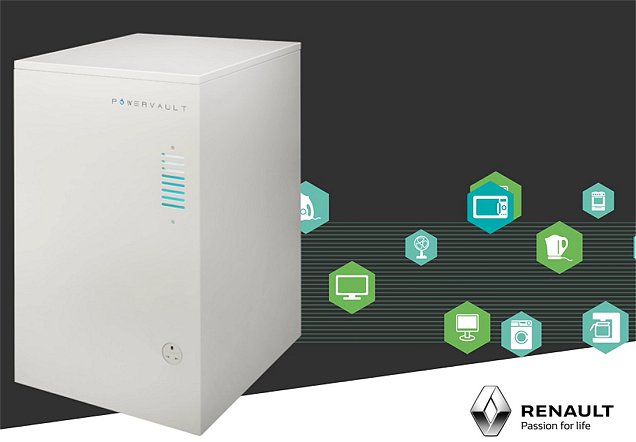
Powervault incorporating re-used Renault EV batteries
Renault and Powervault in the UK have announced a partnership whereby Renault electric vehicle batteries will be re-used for home energy storage units, reducing the cost of a Powervault smart battery unit by 30%.
The partnership will kick off with a trial of 50 units installed in UK solar households next month and run over a year. During the trial, performance of the systems will be monitored and customer reaction ascertained. The results of the trial will help prepare a rollout strategy for general release.
Renault says its EV batteries generally have a service life in electric vehicle applications of 8 to 10 years. Even after that time, there’s still sufficient capacity left for up to an additional 10 years of useful life as solar batteries.
“Thanks to this home energy storage partnership with Powervault, Renault is adding a new element into its global strategy for second life batteries, which already covers a large number of usages from industrial to residential building and districts,” said Renault’s Nicolas Schottey.
“The second life use not only gives additional life to electric vehicle batteries before they are recycled, but also allow consumers to save money. It’s a win-win-win: for EV owners, home-owners and the planet.”
It seems there will be plenty of batteries available as time goes on. Renault says it pioneered electric vehicles in Europe and has so far already sold 120,000 EVs worldwide. Powervault is aiming to sell 30,000 units by 2020, which means it will need 15,000 EV batteries.
Among Renault’s range of EV’s are the curiously named Kangoo, Twizy and Zoe. Renault EV’s aren’t yet available in Australia, with the company saying it is still evaluating the business case here; but some of its vehicles are now in the country to support the evaluation.
Renault isn’t the first auto maker to investigate giving EV batteries a second life in stationary energy storage applications – but the more, the merrier.
Powervault currently offers batteries in two different chemistries as part of its standard lineup – lithium-ion and lead acid. The company’s energy storage solutions don’t have the capacity of competing products such as Tesla Powerwall and sonnenBatterie, but the company says they’ve been developed specifically to meet the needs of the UK market. Designed to be installed inside a home, Powervault says it is the “most practical and affordable solar energy storage system for the UK house market.”
Powervault batteries aren’t available in Australia, but for a list of home energy storage solutions that are (or will be soon), check out SolarQuotes’ battery comparison page; which also provides approximate pricing.

 RSS - Posts
RSS - Posts



I am currently a happy Renault Koleos driver and I love this option.
I have great patience and hope Renault come to the party with Powervault to offer this EV solution here.